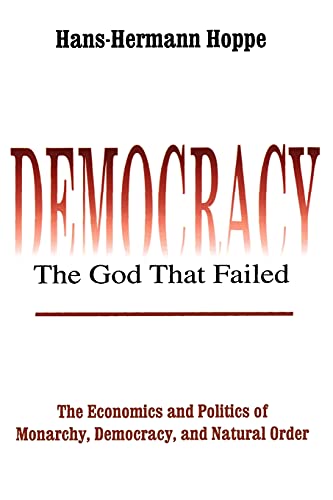Verwandte Artikel zu Democracy – The God That Failed: The Economics...
Democracy – The God That Failed: The Economics and Politics of Monarchy, Democracy and Natural Order (Perspectives on Democratic Practice) - Softcover

Inhaltsangabe
The core of this book is a systematic treatment of the historic transformation of the West from monarchy to democracy. Revisionist in nature, it reaches the conclusion that monarchy is a lesser evil than democracy, but outlines deficiencies in both. Its methodology is axiomatic-deductive, allowing the writer to derive economic and sociological theorems, and then apply them to interpret historical events.
A compelling chapter on time preference describes the progress of civilization as lowering time preferences as capital structure is built, and explains how the interaction between people can lower time all around, with interesting parallels to the Ricardian Law of Association. By focusing on this transformation, the author is able to interpret many historical phenomena, such as rising levels of crime, degeneration of standards of conduct and morality, and the growth of the mega-state. In underscoring the deficiencies of both monarchy and democracy, the author demonstrates how these systems are both inferior to a natural order based on private-property.
Hoppe deconstructs the classical liberal belief in the possibility of limited government and calls for an alignment of conservatism and libertarianism as natural allies with common goals. He defends the proper role of the production of defense as undertaken by insurance companies on a free market, and describes the emergence of private law among competing insurers.
Having established a natural order as superior on utilitarian grounds, the author goes on to assess the prospects for achieving a natural order. Informed by his analysis of the deficiencies of social democracy, and armed with the social theory of legitimation, he forsees secession as the likely future of the US and Europe, resulting in a multitude of region and city-states. This book complements the author's previous work defending the ethics of private property and natural order. Democracy - The God that Failed will be of interest to scholars and students of history, political economy, and political philosophy.
Die Inhaltsangabe kann sich auf eine andere Ausgabe dieses Titels beziehen.
Über die Autorin bzw. den Autor
Hoppe, Hans-Hermann
„Über diesen Titel“ kann sich auf eine andere Ausgabe dieses Titels beziehen.
- VerlagRoutledge
- Erscheinungsdatum2001
- ISBN 10 0765808684
- ISBN 13 9780765808684
- EinbandTapa blanda
- SpracheEnglisch
- Auflage1
- Anzahl der Seiten328
- Kontakt zum HerstellerNicht verfügbar
EUR 4,15 für den Versand von Vereinigtes Königreich nach Deutschland
Versandziele, Kosten & DauerNeu kaufen
Diesen Artikel anzeigenGratis für den Versand innerhalb von/der Deutschland
Versandziele, Kosten & DauerSuchergebnisse für Democracy – The God That Failed: The Economics...
Democracy - The God That Failed
Anbieter: moluna, Greven, Deutschland
Kartoniert / Broschiert. Zustand: New. Hoppe, Hans-HermannThe core of this book is a systematic treatment of the historic transformation of the West from monarchy to democracy. Revisionist in nature, it reaches the conclusion that monarchy is a lesser evil than democracy, but outlines. Artikel-Nr. 601198571
Anzahl: 2 verfügbar
Democracy - The God That Failed: The Economics and Politics of Monarchy, Democracy and Natural Order (Perspectives on Democratic Practice)
Anbieter: Ria Christie Collections, Uxbridge, Vereinigtes Königreich
Zustand: New. In. Artikel-Nr. ria9780765808684_new
Anzahl: Mehr als 20 verfügbar
Democracy â" The God That Failed: The Economics and Politics of Monarchy, Democracy and Natural Order (Perspectives on Democratic Practice)
Anbieter: WorldofBooks, Goring-By-Sea, WS, Vereinigtes Königreich
Paperback. Zustand: Very Good. The core of this book is a systematic treatment of the historic transformation of the West from monarchy to democracy. Revisionist in nature, it reaches the conclusion that monarchy is a lesser evil than democracy, but outlines deficiencies in both. Its methodology is axiomatic-deductive, allowing the writer to derive economic and sociological theorems, and then apply them to interpret historical events. A compelling chapter on time preference describes the progress of civilization as lowering time preferences as capital structure is built, and explains how the interaction between people can lower time all around, with interesting parallels to the Ricardian Law of Association. By focusing on this transformation, the author is able to interpret many historical phenomena, such as rising levels of crime, degeneration of standards of conduct and morality, and the growth of the mega-state. In underscoring the deficiencies of both monarchy and democracy, the author demonstrates how these systems are both inferior to a natural order based on private-property. Hoppe deconstructs the classical liberal belief in the possibility of limited government and calls for an alignment of conservatism and libertarianism as natural allies with common goals. He defends the proper role of the production of defense as undertaken by insurance companies on a free market, and describes the emergence of private law among competing insurers. Having established a natural order as superior on utilitarian grounds, the author goes on to assess the prospects for achieving a natural order. Informed by his analysis of the deficiencies of social democracy, and armed with the social theory of legitimation, he forsees secession as the likely future of the US and Europe, resulting in a multitude of region and city-states. This book complements the author's previous work defending the ethics of private property and natural order. Democracy - The God that Failed will be of interest to scholars and students of history, political economy, and political philosophy. The book has been read, but is in excellent condition. Pages are intact and not marred by notes or highlighting. The spine remains undamaged. Artikel-Nr. GOR003464301
Anzahl: 2 verfügbar
Democracythe God That Failed: The Economics and Politics of Monarchy, Democracy, and Natural Order
Anbieter: Revaluation Books, Exeter, Vereinigtes Königreich
Paperback. Zustand: Brand New. illustrated edition. 220 pages. 9.25x6.25x0.10 inches. In Stock. Artikel-Nr. x-0765808684
Anzahl: 2 verfügbar

